
You are reading:

You are reading:
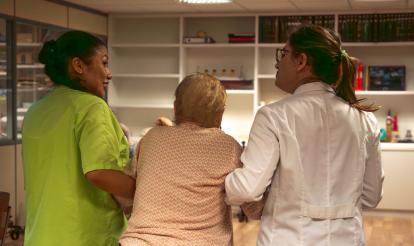
Send your questions to:
Attending to spiritual needs can have a significant impact on the well-being of people in the final stage of life. At the San Camilo palliative care unit in Tres Cantos (Madrid), several patients with advanced illnesses and their families share their experiences of this support, which complements medical care. In turn, three professionals involved in the Comprehensive care for people with advanced diseases programme of the ”la Caixa” Foundation reflect on the importance of the spiritual dimension at such a delicate time.
Taking a walk through the facilities of the San Camilo centre is to be filled with life. Its rooms are divided into themed areas dedicated to literature, with texts on the walls and even on the ceiling, painting, and music – with a piano in the hallway. Its gardens are well tended. The doors are designed so that beds can be wheeled out onto the terraces, allowing those with limited mobility to feel the sun on their skin. There is even a dining room where birthdays and weddings have been celebrated. It is not what one typically imagines when thinking of a palliative care centre.
This facility in Tres Cantos (Madrid) welcomes people who are at the end of their lives. One such person is Asunción de Soto. At 73 years old, she has spent much of her life caring for others as a nursing assistant. Diagnosed with an irreversible condition –emphysema and two tumours in both lungs– she arrived at the centre around three weeks ago. “I’m very ill. I’m still trying to come to terms with it because it’s hard,” Asunción shares.
She is grateful for the care provided by the centre’s professionals: “The medical care is excellent. And the human side is wonderful. They’re attentive to your needs, how you’re feeling, how your illness is affecting you and so on.” And what are those needs, in Asunción’s case? “Above all, accepting how I am and how long I may have to live. When I left the hospital, I either didn’t understand it, or I didn’t want to understand it.”
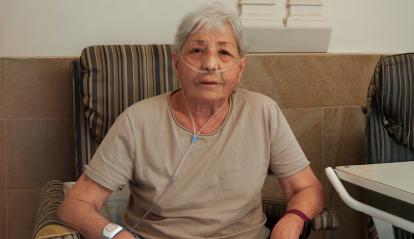
Asunción receives support from a psychosocial care team (EAPS), which is part of the Comprehensive care for people with advanced diseases programme run by the ”la Caixa” Foundation. This project aims to improve the quality of life for people at the end of life by addressing emotional, social and spiritual dimensions. The latter can help meet needs such as Asunción’s – understanding and accepting the stage of life she is in.
Xavier Sobrevia, doctor and advisor to the programme, explains that “if, throughout life, the spiritual and religious dimension holds great importance for many people, it becomes even more meaningful as the end approaches, because it helps with reconciliation, with answering difficult questions, and offers hope for what comes after death.” “It helps people die more peacefully,” he adds.
This spiritual dimension does not necessarily have to be expressed through religion. Yolanda López, a psychologist on the EAPS team, notes that “some people are very religious but not spiritual; some are spiritual but not religious; and others are both religious and spiritual.” She explains the difference between the two concepts: “There are people who are spiritual but don’t follow any religion. The spiritual dimension relates to values, purpose, meaning, personal beliefs, transcendence and interconnectedness.”
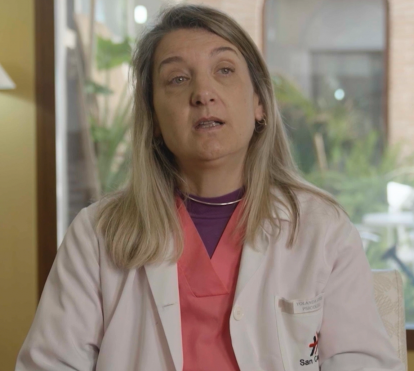
These aspects often take on particular significance as the end of life approaches. “People become deeply connected with their own fragility. At first, a person may express the desire not to suffer and for their loved ones to be okay, but as the illness progresses, their needs can become much deeper, more dynamic and more transcendent,” the psychologist explains.
At that point, she adds, “needs relate to life review, to saying goodbye, to connecting with your closest loved ones, reconciling with yourself, with your beliefs and with your life.” She also identifies “a need to love, to be loved, to have loved and for your life to continue – to be carried on even after you’re gone.” This, she says, is the legacy: “to be remembered, to leave something of value to your loved ones.”
The coordinator of the EAPS and head of the team’s Spiritual Care Service, Nino Lozano, agrees that “the spiritual dimension is fundamentally helpful” at the end of life.
Support for these spiritual needs is not provided in isolation or in separate compartments, but rather as part of comprehensive care. “The team includes a doctor, a nurse, a psychologist, care assistants, social workers, spiritual care providers and volunteers… We work in an interdisciplinary way: we need the interaction between all of us. In this interdisciplinary approach, we all support one another,” says Lozano.
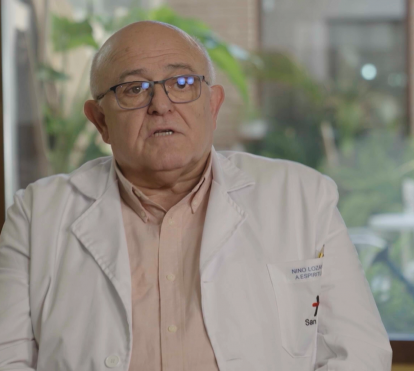
Paco Leniz is another person receiving support from these teams. He is 81 years old, an industrial engineer and has worked in the transport sector. He is passionate about culture in all its forms: “I like painting, sculpture, theatre, cinema… Any artistic activity, I always feel the need to learn about it. Just as I do with any scientific advance.” He came to this centre due to an oncological condition that can no longer be cured.
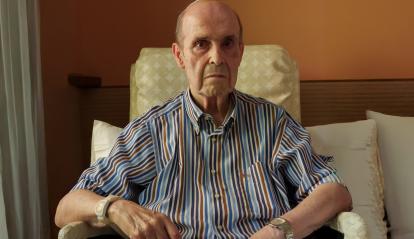
Paco shows a strong determination to maintain his independence. “I try with all my might to carry out all my activities. I put all the effort I can into looking ahead. What’s behind me is already in the past,” he says. He values the team’s support highly: “They help me feel that I’m still in the world and keep me going.”
For him, his beliefs play a significant role. “It’s very important. Deep down, religion always helps a lot,” Paco reflects. Asunción, on the other hand, does not consider herself a religious person. She does believe that “there’s something higher.” But for her, the most important thing is her family: “Right now, they’re the ones giving me the push to carry on. Otherwise, I would probably have given up.”
The ”la Caixa” Foundation recognises the wide diversity of perspectives from which spirituality is approached. To help professionals support the people they care for while taking this diversity into account, it offers the guide Religious support at the end of life. Useful information on beliefs and convictions, which outlines key aspects of more than a dozen different faiths and their approaches to death.
In the words of Xavier Sobrevia, who coordinated its preparation, this guide “explains the key aspects that can help strengthen the connection and improve the quality of care provided by healthcare professionals, always with the aim of bringing greater comfort and peace to the patient.” The guide includes “resources that can be of great value in comforting the person who is ill and may be very helpful for the professional.” “It’s vital for professionals to have a basic understanding of the patient’s religion when we know that these beliefs are important to them and help them live better,” argues the expert.
The work of the EAPS teams does not end when a person passes away. They continue to support the family members in their grieving process, which they also help to ease beforehand through a preventive approach.
Yolanda López explains that there are risk factors that can complicate grief and that some of these can be modified, as well as protective factors. “One of the factors that most affects the grieving process is the perception that the loved one was well cared for. If the family member doesn’t fully understand the symptoms, or whether the patient is suffering or not… all of this will have an impact on the grieving process,” she explains. “So, when we see that a relative isn’t understanding the symptoms during the final stage, we alert the doctors and nurses so they can try to explain that the person is not suffering, that it’s a natural process and so on. And that turns a risk factor into a protective one during grief,” she adds.
The spiritual dimension also plays an important role in the grieving process. For Nino Lozano, it encompasses certain needs that many people experience, such as the need to “give thanks for the life shared”, to “forgive oneself for the past”, to “acknowledge the legacy”, and to “say goodbye”. “You can’t say goodbye to someone who has shared your life for 40, 50 or even 80 years as if nothing had happened; you need to say farewell. Rituals are as important as discovering the value of solidarity, because around that person who was important to you there are also others for whom they were equally important. That helps you begin the grieving journey in a much healthier way,” he explains.
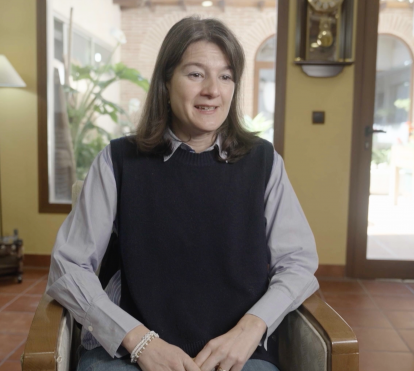
María Bueno is preparing herself for that journey. Her mother, María Ángeles, aged 78, has been at the centre for six weeks. “This illness came as a surprise to the family because she had always been a fairly healthy woman,” her daughter explains. “What has always characterised my mother is her calmness and her positive attitude in the face of any problem,” she says.
Two years ago, she was diagnosed with gynaecological cancer. She underwent treatment which initially proved effective, and the illness receded. “Last summer, when people asked her how the cancer was going, she would say: ‘Don’t ask me about the cancer anymore, that’s behind me now.’” However, a few months ago, signs of the illness returned and it progressed quickly, bringing her mother to this irreversible stage.
In María’s case, her religious beliefs are helping her cope with this phase of saying goodbye to her mother. “At first, when we heard the news, it was very sad, and we suffered. But then hope emerged,” she explains. Spirituality helps her find meaning in what is happening: “I’m crying now, but we’ve had many moments of peace, serenity and trust. I know that my mother has fulfilled her purpose.”